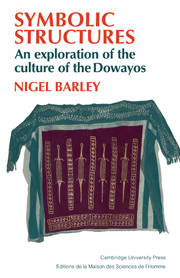Book contents
- Frontmatter
- Contents
- Acknowledgments
- Preface
- 1 The ethnographic background
- 2 Symbolism and the punctuation of culture
- 3 Some problems of the representational model of symbolism
- 4 The leopard cannot change his spots
- 5 Water and fertility
- 6 Tarniisnohgbarklele: ‘the place where the old Fulani woman was beaten to death’
- 7 ‘It is only thanks to me that you were circumcised’
- 8 The seasons of the year and the joker in the pack: relations of nesting and quotation
- Appendix: The festivals
- Notes
- Bibliography
- Index
- Frontmatter
- Contents
- Acknowledgments
- Preface
- 1 The ethnographic background
- 2 Symbolism and the punctuation of culture
- 3 Some problems of the representational model of symbolism
- 4 The leopard cannot change his spots
- 5 Water and fertility
- 6 Tarniisnohgbarklele: ‘the place where the old Fulani woman was beaten to death’
- 7 ‘It is only thanks to me that you were circumcised’
- 8 The seasons of the year and the joker in the pack: relations of nesting and quotation
- Appendix: The festivals
- Notes
- Bibliography
- Index
Summary
Skull-festival: zuuldukyo (‘throwing on the skulls’)
(a) A Dowayo's skull-festival can be celebrated at any time after his or her death and will be organised by patrilineal kinsmen. Often this is the result of a member of the family being plagued by dreams of the dead person which leads to an expectation that he will be afflicted with disease by the spirit of the deceased unless steps are taken. The festival requires much in goats, millet and cattle and a man will expect to gain much prestige from a successful skull-festival. Normally, all the skulls of recently dead in the same skull-house, and possibly associated blacksmiths will be involved. The financial arrangements are simplest when all herd communally, otherwise payments will have to be made. A man begins by inviting kin and affines to a beer party where the topic is raised. If this passes off well, a second party is organised. If this too passes without incident, the omens are taken.
A sheep is led to the dead men's shelter and stretched on its back. The skin is cut off the back legs and rest of the body except for the forepaws and head. If it suffers this without excessive complaint, the time is held to be appropriate. The beast is killed and the excrement flung on the skulls. A date is fixed in the rainy season. Not only kinsmen attend a skullfestival. Friends and strangers flock in equal numbers to the scene, often travelling overnight on foot. It is not unusual to find some six hundred to a thousand Dowayos present at one time. Activities are spread over a number of days.
Information
- Type
- Chapter
- Information
- Symbolic StructuresAn Exploration of the Culture of the Dowayos, pp. 99 - 112Publisher: Cambridge University PressPrint publication year: 1983
